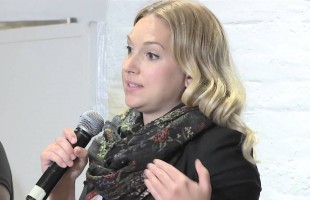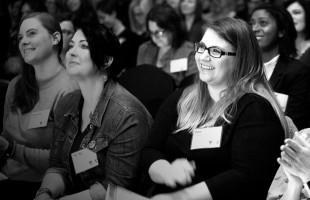
Emerging Creative Track
As POSSIBLE's Global Learning + Development Director, Juan oversees all learning efforts for the agency, from strategy through execution. Firmly planted on the ideology that emotionally intelligent people make more effective leaders, Juan’s drive is to create and deliver learning opportunities that help people advance in their discipline or craft while simultaneously increasing EQ.
MY FAILURE RÉSUMÉ
Speakers:
Libby Brockhoff, Founder & CEO, Odysseus Arms
Kirya Francis, VP of Solutions, GSD&M
Khoi Vinh, Principal Designer, Adobe
Presenters shared stories about their failures, how they managed them, and lessons learned from them. Highlights include:
- Instead of looking at failure as something negative, consider it a time to course-correct and pivot.
- Embracing failure helps us go from “lemons to lemonade.” When we do so, we:
- Grow personally and professionally, as evidenced by the success stories these presenters shared
- Tend to take more chances and innovate
- Become more empathetic
- Building support networks – even before we feel we need them – is crucial to help us succeed.
- Before making big decisions, consulting our support networks can help us explore options we may not have otherwise considered.
- When we are successful, others forget our failures.
- Every time we fail, it is important to leave the emotional baggage behind.
THE ART AND CRAFT OF STORYTELLING
Speaker: Megan Jones, Producer of The Moth
Both inspiring and practical, this session focused on the value of storytelling to connect emotionally with our audience. Highlights include:
A sequence of events makes up a story. When you add details, a plot emerges. Details are magnets that attach you to the story.
Stories help us:
- Remember
- Understand
- Create meaning
- Envision futures
A strong story requires:
- A strong set-up, which helps our audience become invested in what we are about to tell them
- Vitality/personality that enables the audience to experience that moment of transformation we are conveying
- Bravery, a willingness to leave it all on the “stage” and being witnessed
When constructing a strong story, consider the acronym C.R.O.W.E.:
- Characters – who are the people in our story
- Relationships – how are the characters related to one another, their surroundings and the audience
- Objective – what are the characters trying to accomplish
- Where – place where the story takes place
- Emotion – what are characters feeling and how do you want your audience to feel
Quotes shared from The Moth’s Artistic Director, Catherine Burns:
- “Sometimes it is easier to try and make sense of the world one story at a time.”
- “We live in a world where bearing witness to a stranger’s unfiltered story is an act of compassion.”
STORY MEETS BRAND: MODERNIZING THE GOOD HUMOR BRAND
Speakers:
Jacqueline Lieberman, Managing Director, Story Worldwide
Nicole Ogoff, CMO, Managing Director, Story Worldwide
Leslie Miller, Director of Marketing, Unilever.
The importance of connecting emotionally through stories with consumers was explored through a case study of how Story (agency) helped Unilever (client) modernize its Good Humor ice cream brand. Highlights include:
Successful brands tell stories, not ads. Skip the ad and tell stories, starting with the “why” instead of the “what.” Brands with the best stories win hearts, minds and wallets.
Instead of asking “what is your brand story?” start asking “does your story matter?” Is the story authentic and does it move people to act? When you FEEL something, you DO something.
Measure the emotional impact of the story by taking an approach that looks at:
- Brand values – What do the brand values mean? Add context to the value so they become meaningful.
- Brand personality – Which archetype is the brand? What’s its aspirational personality?
- Point of difference – Go beyond the brand’s entry stakes and valued attributes and focus on its differentiators.
- Story platform – Once the aforementioned in better understood, it becomes the brief.
- Craft stories instead of ads
- Story score – The story needs to tackle System 1 thinking, the cognitive process that produces fast, intuitive reactions and instantaneous decisions. Compare text against other brands and ask “would you buy/sell based on what you’ve read?
LUNCH + LEARN: NEGOTIATION SKILLS: HOW TO GET PAID WHAT YOU’RE WORTH
Speaker: Stephanie Peirolo, Leadership Consultant, Upperhand LLC
Negotiating is a skill, not a superpower. That means that we can learn to do it and then improve it through practice. Highlights included:
Embrace discomfort. Negotiating can be extremely uncomfortable for most. Don’t let that steer you away from doing it.
Know what you want. What’s most important? Money? Time? Creative? Understanding that will help guide your conversation.
Learn to talk about money. Practice having conversations about money with people you know and trust, by agreeing to discuss “taboo” topics such as “how much did you make last year?” or “how much did your house cost?”
Know how much you should be earning. Learn that by doing your research and talking to at least three people in market.
Not qualified? Apply anyway. Men tend to apply to jobs for which they are 75% qualified. Women tend not to. Break that trend.
Know your numbers. When you know what you want (see above), look at the total value of benefits and get clear about your:
First ask: the max number you’d like (more than the top of the range, if one is offered)
Walk away: the minimum you will accept
Be clear about your strategic advantage. What distinguishes you from others? What are your accomplishments? How have you demonstrated value?
Learn what keeps them up at night. Understanding this can help you articulate how you can help.
Tell them how you can help them achieve goals.
Praise yourself. Craft a story that is:
- Concise
- Results-oriented
- True
Breathe. Before your meeting, take deep breaths to calm your nerves.
Ask for the money and stop talking. Don’t apologize nor elaborate (which might require practice beforehand).
Prepare for potential roadblocks, including:
- Questions about current salary.
Get comfortable stating, “I prefer not to answer that.”
- “You’re not worth it.”
- Check your body (remain visibly calm).
- Reiterate your value.
- Ask questions.
- Offer is above the walk away number.
- Sleep on it. Don’t accept immediately.
- Offer is below the walk away number.
- Walk away.
- Pushback.
- Don’t apologize.
- Point out the value of knowing how to negotiate.
Persevere.
MY LIFE BRIEF
Speaker: Bonnie Wan, Director of Brand Strategy & Partner, Goodby Silverstein & Partners
This presentation focused on crafting a Life Brief, a tool for creative living that answers the question “what do I really want?” We may not be able to have it all, but we can have all that matters. Highlights included:
In order to craft this Life Brief, we need to:
- Find our quiet.
- Turn off our minds, turn on our hearts.
- Change our story to change our lives.
COMMUNITY STARTS WITH YOU
Speakers:
Melody Henderson, Creative Strategist, Facebook Creative Shop
Nico Martínez, Art Director, Facebook Creative Shop
This inspiring presentation focused on the personal and social impact that starting or joining a community can have. Highlights include:
- When she decided to stop chemically treating her hair and going natural, Melody found herself unsure about how to manage her own curls. She sought advice by joining an email thread of women in the same situation. That led to creating The Curly Girl Collective (an experiential marketing group that specializes in multicultural beauty) and CURLFEST® (the world’s largest natural beauty festival with a mission to build a global community that educates, celebrates, and connects women with naturally curly hair).
- Though Nico didn’t start her own community, she joined one for which she was passionate. For years, she has been creating paintings that she hangs on city walls for her public arts project, therobbedofbeautyproject.com.
NEXT CREATIVE LEADERS
Speakers:
Alexandra Sobiecki, Art Director, Spotify
Jess Toye, Senior Art Director, JWT
Kate Baynham, Copywriter, Goodby Silverstein & Partners
Sakshi Choudhary, Creative Supervisor, OgilvyOne
This talented panel shared insights from their experiences are next creative leaders. Highlights include:
- In order to help junior creatives make great work, we have to let them go through the process of discovery, even if we know the answers. This requires discipline, particularly in our fast-moving industry.
- A great idea cannot come before what the client stands for. It needs to complement and enhance it.
- Diverse views help make ideas stronger because they’ve been challenged.
- Social media is still a human way to connect with people.
- Going beyond the brief can result in great work that has social impact.



